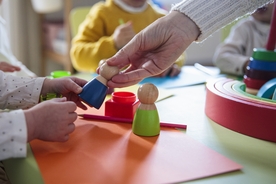The parents of a woman who chose to be euthanized at the age of 33 have spoken out about why they supported her difficult decision.
Assisted dying remains a divisive topic, with some believing that people with terminal conditions should have the choice to end their life before losing their quality of life, while others believe that nature should always take its course.
However, the debate gets even more complicated when the person choosing euthanasia is not considered terminally ill.
One family has revealed why they decided to support their 33-year-old daughter in ending her life with assisted dying.
Esther Beukema died on December 10, 2021, having chosen to pass away in bed in her childhood bedroom, wearing a Mickey Mouse jumper and odd socks, with one belonging to her mom and one to her dad.
She was surrounded by her family - her mom, dad, and younger brother, as a nurse administered a lethal dose of medication to allow her to slip away, which she did just five minutes later.
Esther had campaigned for the right to be euthanized for over a decade, due to her struggles after being diagnosed with anorexia nervosa at the age of 18.
Though it is not considered a terminal illness, anorexia can often be fatal for the patient, and has the highest mortality rate of any psychological disorder, whether that is through complications such as heart conditions and organ failure, or through patients taking their own life.
Tragically, Esther had often told her mother, Ellen, that she did not want to be here, saying: "I don’t want to exist."
She had made multiple attempts to take her own life, and had fought for the right to die with dignity by being euthanized.
While it is not a decision any parent ever wants to make, her mother and father have revealed why they chose to support Esther in ending her suffering, despite it meaning them losing their daughter.
Ellen explained to the Telegraph that she believed a medically assisted death was more "humane" than the thought of Esther dying by suicide, her husband Rob found it much harder to accept.
 A lethal dose of medication was administered by a nurse to help Esther slip away. Credit: ZeynepKaya/Getty Images
A lethal dose of medication was administered by a nurse to help Esther slip away. Credit: ZeynepKaya/Getty Images
He had suggested that there may be a therapy or treatment that hadn't yet tried that could help Esther see a way through her eating disorder, explaining: "As a dad, I tried to show Esther a little bit of blue sky… that there’s always hope. That tomorrow, perhaps it will be better."
Their differing opinions put a strain on the couple's marriage, but Rob admits that after having therapy of his own, by the time Esther died he was "at peace" with her decision to end her life on her own terms.
Euthanasia for people with a mental illness has been a reality in the Netherlands, where the Beukemas live, for over 20 years, as under the Dutch Termination of Life on Request and Assisted Suicide (Review Procedures) Act of 2002, euthanasia is legal for psychiatric as well as physical conditions, provided doctors believe there is "no reasonable alternative" and that the patient's suffering is "unbearable with no prospect of improvement".
Ellen revealed that she chose to support her daughter so that she could be surrounded by love in her final moments, explaining: "She didn’t have to die alone, she was with the people she loved. And that is what you want for everyone."
She added that as Christians, she and Rob believe Esther is "in a better place" after "always struggling here in this life."
They added that Esther had had a happy childhood in a loving family with siblings close to her own age, and always did well in school and her extracurricular activities, including gymnastics and piano lessons.
The first signs of her illness came when she hit adolscence, struggling with the move to secondary school where she found it hard to make friends and struggled with perfectionism.
Esther first said she wanted to start eating more "healthily" but her diaries, which she shared with her psychiatrist, revealed that she had started calorie counting at just 17 years old in 2005.
Just a year later, she was diagnosed with anorexia and was later told she also had some symptoms of borderline personality disorder, and doctors believed she likely also had autism.
By 2007 she was severely malnourished and required hospitalization, beginning a cycle of force-feeding to help her gain weight, before she would lose it all again, leaving her more traumatized and depressed after each hospital stay.
Throughout her many admissions, Esther continued to keep her diaries, where one heartbreaking entry from April 2011 reads: "I just want to die. I don’t want to live any more. There’s nothing to it. Nowhere."
She first requested euthanasia in 2012 but her request was denied because she was not considered psychologically competent.
Her parents had a glimmer of hope that things may improve after Esther fell in love with a fellow patient on a psychiatric ward in 2017, with the couple quickly moving in together on her release, where they planed to get married and even got a cat together.
The pair had a few months where things improved, but Esther ended up calling off the wedding two weeks before they were due to tie the knot.
Just two years later, after turning 30, Esther began pursuing her mission to get approved for euthanasia again and was eventually approved.
Her family says that the weeks that followed were the "most beautiful" since Esther had begun to get ill, and she chose to move back home with her parents and spend time laughing and talking with her family, as well as planning her own funeral.
 Esther had planned her own funeral in the weeks before her death. Credit: DarrenMower/Getty Images
Esther had planned her own funeral in the weeks before her death. Credit: DarrenMower/Getty Images
When her final moments came, Ellen sang a bedtime prayer to her as she had done when she was a child, and Rob added that Esther's death was peaceful, explaining: "I saw her face. No anger. Very happy."
Ellen added: "We are at peace with it, I think. For us, I think it’s the feeling that there is a life before, and a life after. It’s not that the life after is very bad, but you have to discover how to start again. You have to learn to see the good things and to enjoy them."
The couple shared their daughter's story in the hopes of ending the secrecy around end of life decisions, as well as to keep her memory alive, explaining: "If you don’t talk about her, then she doesn’t exist any more. Then she is really dead."












